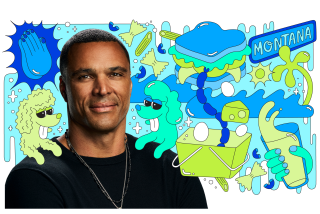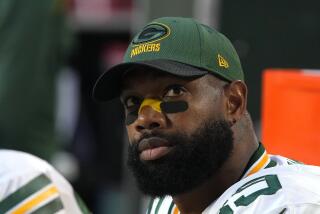He Walks the Walk and Talks the Talk
- Share via
Whether he’s hosting his own television show or playing in an NBA summer league, Kansas City Chief tight end Tony Gonzalez repeatedly has ventured outside his comfort zone to become more diverse.
This off-season, that quest took him to another land.
Gonzalez, for years embarrassed that he couldn’t speak Spanish, spent part of the spring living with a family outside Mexico City to learn the language. It has been a productive few months for Gonzalez, who next Friday begins training camp with the Chiefs in River Falls, Wis.
“During the games, if I’d go to Oakland or a place where there are a lot of Latin people -- actually almost everywhere -- I’d walk out and people would say, ‘Tony, hola. ¿Como estas?’ I’d be like, ‘Bien.’ And then they’d ask me more and I’d be like, ‘No hablo.’ ”
Gonzalez, a former California basketball and football player who has developed into one of the best tight ends in the game, said he has longed to learn Spanish since his childhood. His paternal grandfather was born in Portugal and moved to Argentina, where he learned Spanish.
“My dad, for whatever reason, didn’t learn Spanish when he was growing up with my grandfather,” Gonzalez said. “Actually, if you talk to a lot of people from that generation, the Latin parents didn’t teach their kids Spanish on purpose. They wanted them to be American, and they thought it would hold them back if they had any type of accent.”
Gonzalez took a Spanish class in Kansas City a few years ago but never got serious about learning it until this off-season. He figured the best way to do it was the sink-or-swim method. He moved to San Miguel Allende, about an hour’s drive outside Mexico City, took six hours of language classes a day, and stayed with a family that had played host to a friend.
“It’s a beautiful place,” he said. “Lots of vacationers, lots of retirees down there. They had cobblestone roads, tiles along the sidewalks, very Spanish -- not Mexican -- it had a very European feel.”
For Gonzalez, whose heritage is also Jamaican, American Indian and Scottish, the place felt a bit like home.
“I wanted to get in touch with the Latin side of me,” he said. “I grew up in Huntington Beach, a lot of my family was in Carson, and I’ve seen both sides of black and white. I’d never really experienced the Latin side of things.”
Although he’s far from fluent in Spanish, Gonzalez is comfortable enough to do NFL radio spots that will air in Mexico, and he recently spoke at a predominantly Latino school in Kansas City.
“A lot of people don’t know this, but in Mexico there’s 20 million fans down there,” he said. “They’re big supporters of the NFL, devoted fans. I thought that, besides kickers, a lot of people know me through the NFL. I thought this would be a good chance for me to connect.
“Even in Kansas City, a lot of these kids can’t speak English. So it’s not like Priest Holmes or Dante Hall or Trent Green can go to these schools and talk to the kids.”
Now, Gonzalez can.
“As long as they speak muy lentamente,” he said. “Very slowly.”
*
We’ll find out soon whether Brock Lesnar is a phenom or a fool.
Lesnar, the 295-pound World Wrestling Entertainment champion, is trying to make an NFL roster despite not playing football since high school. So serious is he about his goal, he walked away from a seven-year, $4.5-million wrestling contract to chase the dream.
“He has a burning desire to do this,” said his agent, Ed Hitchcock, who said Lesnar has drawn interest from the Vikings, 49ers, Packers, Eagles, Dolphins, Colts and Cowboys. “All his energy is focused on this.”
A former NCAA wrestling champion, Lesnar figures he’s plenty quick, strong and athletic enough to play defensive end in the NFL. Not surprisingly, so does his agent.
“He is such a phenomenal athlete, I think he can do this,” Hitchcock said. “We both realize that he has a significant road to develop because he didn’t play college football.... [But] football’s been a dream of his. He had an opportunity to play college football at Minnesota, but he was really focused on winning the national championship in wrestling when he was there.”
Lesnar, a self-described “blue-collar redneck,” told ESPN.com that he’s hoping to hook up with a team, possibly spend a season or two on the practice squad, then ascend to NFL stardom. He’s certainly built to do some damage. He bench-presses 475 pounds, squats 695, and looks as if he doesn’t have an ounce of fat on his 6-foot-3 frame. Hitchcock said Lesnar was prepared to prove he was steroid-free.
“He’s planning to take an NFL-sponsored drug test,” Hitchcock said. “He’s confident that it’s not going to be an issue. He wants to hit it straight on.”
To hear Lesnar, it sounds as if he’s ready to hit anything that moves.
“If it was legal and I wouldn’t get in trouble, I’d pick a fight on every street,” he told the website. “If I wouldn’t lose any money or nothing, I would fight. I’d fight every day.”
*
Gonzalez, for one, doesn’t like Lesnar’s chances of making the jump from wrestling to pro football. He doesn’t know Lesnar -- the name didn’t even ring a bell -- but Gonzalez has met more than a few deluded fellows who think they can push their way into the NFL if their biceps are big enough. He saw a lot of those guys on the set of “Any Given Sunday,” where he worked as a football consultant.
“They had these tryouts, and all these actors were out there trying out for the film,” Gonzalez said. “The people making the movie wanted to see how the actors looked in pads. Bill Bellamy was out there, Taye Diggs was out there, Puffy [Combs], Cuba Gooding Jr., and a lot of big actors -- guys who you didn’t know but were big and thought, ‘OK, I’m going to try out for this football movie’ -- and they were like the worst athletes you’ve ever seen. They were just horrible. Some were good, but it was very rare. Most of them couldn’t even go 10 yards and cut out. It was embarrassing. I felt really sorry for them. They were really slow. It just let me know that the average guy can’t do this.”
If Lesnar winds up in an NFL training camp this summer, Gonzalez said, he’ll get an education.
“People think it’s so easy,” he said. “They look at it and think, ‘Oh, it’s rough. But I bet it’s not that hard.’ ... Just watch a football game from the sideline and you’ll see how fast and how hard these people are coming at you. Full speed. Three hundred pounds. And when you get hit, it’s like a car wreck. It’s not for the weak. A lot of real tough guys think, ‘I can handle this.’ It’s a different personality.”
More to Read
Go beyond the scoreboard
Get the latest on L.A.'s teams in the daily Sports Report newsletter.
You may occasionally receive promotional content from the Los Angeles Times.











